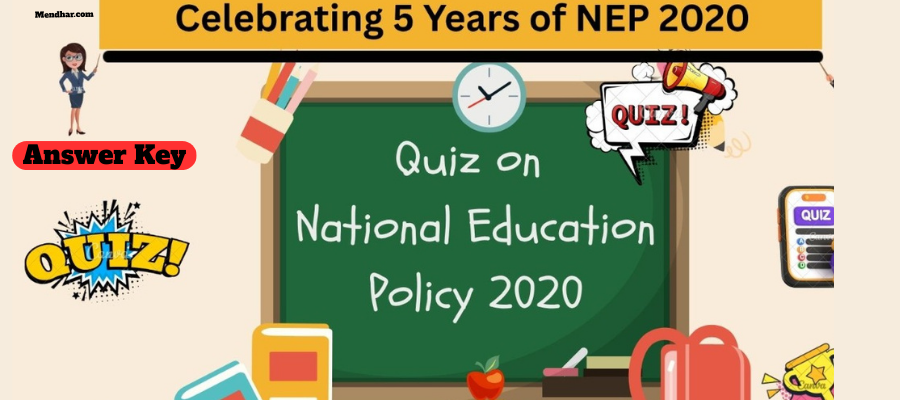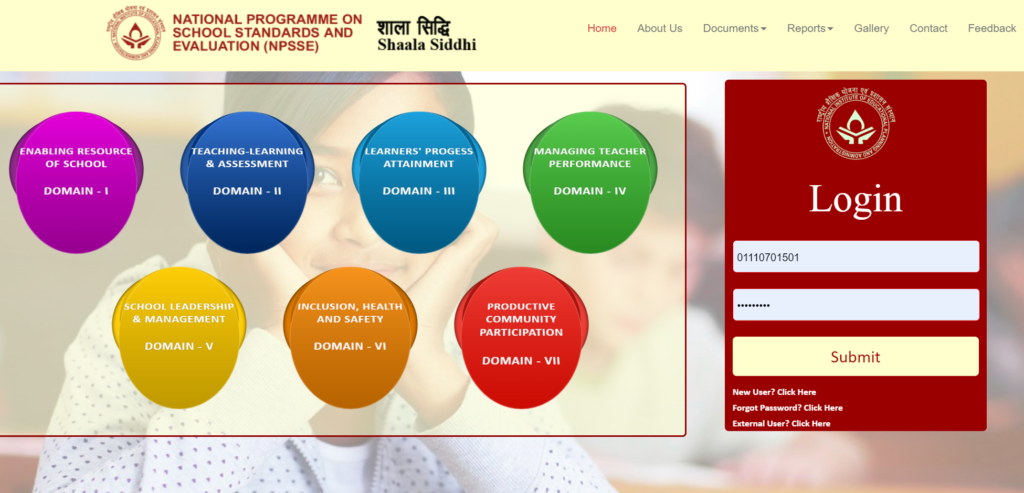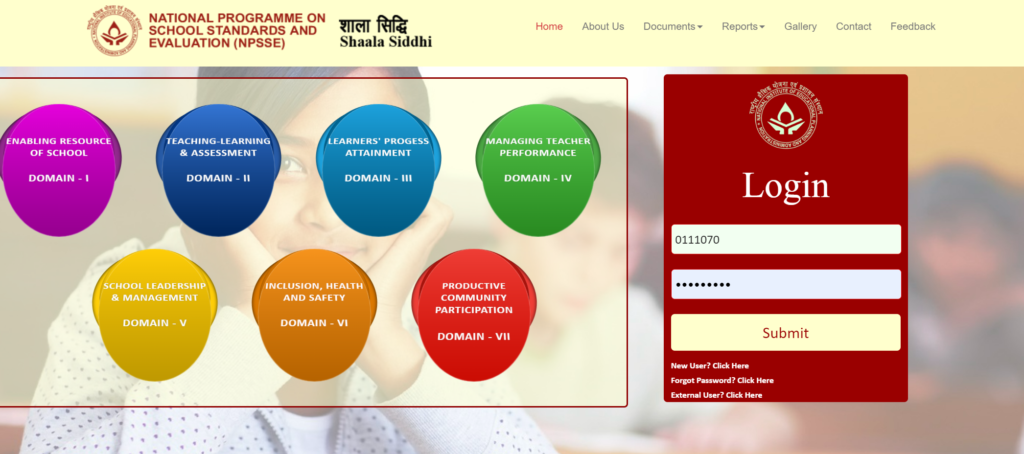Table of Contents
ToggleAnswer Key : Quiz on NEP 2020: Test Your Knowledge of India's Education Transformation

1. What is the overarching aim of the National Education Policy (NEP) 2020?
✅ To transform the education system to ensure holistic, flexible, and multidisciplinary learning
The NEP 2020 aims to revolutionize India's education system by making it more holistic, flexible, multidisciplinary, and aligned to the needs of the 21st century. This transformative vision seeks to address the diverse learning needs of students while promoting creativity, critical thinking, and innovation throughout the educational journey.
2. According to NEP 2020, student assessment should be:
✅ A continuous, multidimensional process involving self, peer, and teacher assessment
NEP 2020 emphasizes the shift from rote memorization to competency-based learning. Assessment should be regular, formative, and competency-based to promote learning and development. It should provide feedback to students to help them identify their strengths and areas for improvement rather than simply ranking them.
3. Which platform is promoted by NEP 2020 to provide digital content to teachers and students?
✅ DIKSHA
DIKSHA (Digital Infrastructure for Knowledge Sharing) is the national platform for school education that provides high-quality educational resources for teachers and students. It supports multiple languages and formats, making learning materials accessible to diverse learners across the country.
4. As per NEP 2020, which of the following is a key strategy to bridge the digital divide in school education?
✅ Ensuring equitable access to digital infrastructure, content, and training for teachers and students
NEP 2020 recognizes the digital divide in education and emphasizes the need for equitable access to technology. The policy advocates for providing adequate digital infrastructure, resources, and training to both teachers and students, especially in rural and remote areas.
5. How does the NEP-2020 framework support the implementation of the PM e-Vidya DTH channels?
✅ By integrating digital and online education into the school curriculum to enhance access and quality of education
NEP 2020 supports the integration of technology in education through various initiatives, including PM e-Vidya DTH channels. This approach aims to make quality education accessible to all students, regardless of their geographical location or socioeconomic background.
6. What is the primary purpose of the National Educational Technology Forum (NETF) proposed in NEP 2020?
✅ To facilitate the exchange of ideas on the use of technology to enhance teaching, learning, and assessment
The National Educational Technology Forum (NETF) will serve as a platform for free exchange of ideas on using technology to enhance learning, assessment, planning, and administration. It will provide evidence-based advice on technology integration and help build digital infrastructure across educational institutions.
7. What is the purpose of the National Professional Standards for Teachers (NPST) proposed under NEP 2020?
✅ To define expected roles, competencies, and performance benchmarks for teachers at different stages
The National Professional Standards for Teachers (NPST) will define the expectations from teachers at different career stages. It will guide teacher preparation, recruitment, deployment, professional development, and career progression, ultimately enhancing the quality of teaching across the country.
8. NEP 2020 recommends Continuous Professional Development (CPD) for teachers of how many hours annually?
✅ 50 hours
NEP 2020 emphasizes the importance of continuous professional development for teachers. The policy recommends that teachers engage in at least 50 hours of CPD opportunities every year to stay updated with the latest pedagogical techniques and subject knowledge.
9. One of the key goals of introducing vocational education in schools, as per NEP 2020, is to:
✅ Integrate skills and work exposure to develop dignity of labour and employability
NEP 2020 aims to integrate vocational education into mainstream education to expose students to various professions and develop practical skills. This approach seeks to eliminate the hierarchy between academic and vocational streams while enhancing students' employability.
10. According to NEP 2020, school assessments should shift focus from rote learning to:
✅ Conceptual understanding and critical thinking
The policy emphasizes the need to shift from content-heavy curriculum and rote learning to fostering conceptual understanding, critical thinking, and creativity. Assessment patterns will be reformed to align with this new approach to learning.
11. What type of report card does NEP 2020 propose to assess students holistically?
✅ Holistic Progress Card
The Holistic Progress Card will provide a comprehensive overview of each student's progress in cognitive, affective, and psychomotor domains. It will include self-assessment, peer assessment, and teacher assessment to give a 360-degree view of the student's development.
12. The three-language formula encourages students to learn:
✅ Three Indian languages, including one regional
The three-language formula promotes multilingualism and national unity. While the implementation will be flexible based on regional needs, the policy encourages the learning of three languages, preferably two native to India, with at least one being a regional language.
13. NEP 2020 promotes the use of which language as the medium of instruction till at least Grade 5?
✅ Mother tongue/home language
NEP 2020 strongly advocates for the use of home language/mother tongue as the medium of instruction until at least Grade 5, but preferably till Grade 8 and beyond. Research shows that children learn best when taught in their native language, especially in their early years.
14. What is a key benefit of adopting toy-based pedagogy in early childhood education, as emphasized in NEP 2020?
✅ It promotes hands-on learning, creativity, and conceptual understanding
Toy-based pedagogy helps children develop critical cognitive, social, and emotional skills through play. It makes learning enjoyable and meaningful while fostering creativity, problem-solving abilities, and conceptual understanding in young learners.
15. The new curriculum structure for school education under NEP 2020 is:
✅ 5+3+3+4
The new 5+3+3+4 curricular structure corresponds to ages 3-8 (Foundational Stage), 8-11 (Preparatory Stage), 11-14 (Middle Stage), and 14-18 (Secondary Stage). This restructuring recognizes the importance of early childhood education and aligns with the developmental stages of children.
16. Which of the following is a key focus area under the FLN Mission as per NEP 2020?
✅ Reading with comprehension, writing, and basic numeracy
The Foundational Literacy and Numeracy (FLN) Mission aims to ensure that every child achieves basic reading, writing, and numeracy skills by Grade 3. This is considered an urgent national priority as these skills form the foundation for all future learning.
17. What is Vidya Pravesh as introduced under NEP 2020?
✅ A 3-month play-based school preparation module for Grade 1 students
Vidya Pravesh is a 3-month play-based school preparation program designed for children entering Grade 1. It aims to ensure that all children are school-ready by exposing them to a variety of developmentally appropriate activities that promote cognitive, social, and emotional development.
18. What are the four National Curriculum Frameworks (NCFs) proposed under NEP 2020?
✅ NCF for Early Childhood Care and Education, NCF for School Education, NCF for Teacher Education, NCF for Adult Education
NEP 2020 proposes the development of four National Curriculum Frameworks to guide the transformation of education across different sectors. These frameworks will be developed by the National Council of Educational Research and Training (NCERT) in consultation with various stakeholders.
19. Who was the Chairperson of the Committee that drafted the National Education Policy 2020?
✅ Dr. K. Kasturirangan
Dr. K. Kasturirangan, former chairman of the Indian Space Research Organisation (ISRO), chaired the committee that drafted the National Education Policy 2020. The committee included experts from various fields who worked extensively to create this comprehensive policy document.
20. What is the full form of NEP?
✅ National Education Policy
NEP stands for National Education Policy, which is a comprehensive framework to guide the development of education in India. The NEP 2020 replaces the previous National Policy on Education, which was formulated in 1986 and modified in 1992.


